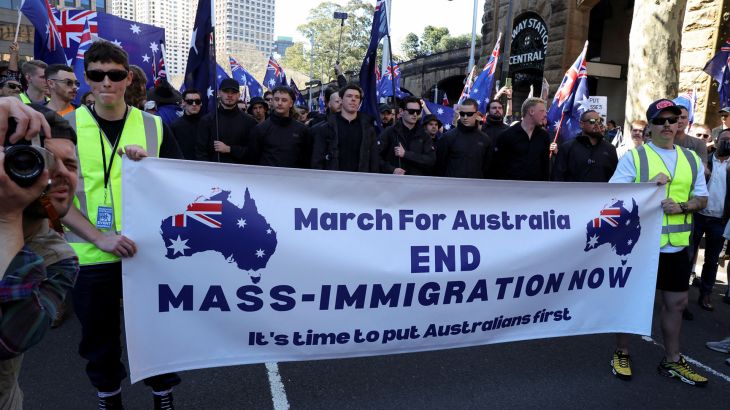Rise of Extreme Right Movements in Australia Sparks Concern
In the past few days, a series of protests known as “March for Australia” took place in multiple Australian cities. An assorted mix of people, including declared neo-Nazis and politicians, gathered in unison demanding a stop to intense immigration. These kinds of demonstrations aren’t solely happening in Australia. Anti-immigrant sentiments are also prompting similar protests in the United Kingdom in cities like London, Birmingham, and Bristol.
Despite some arguing that the rallies in Australia were nonvoluntarily seized by the extreme-right National Socialist Network (NSN), evidence shows a strong underpinning in far-right ideologies. Concepts such as ‘remigration’ and ‘the Great Replacement theory’ were ingrained in the reality of these marches. Prior to the protests, an investigation by ABC located these themes listed as key motivations on the event organizers’ web page, although these were subsequently removed.
The calls for ‘remigration’ were pivotal to these demonstrations. This ideology revolves around the mass repatriation of immigrants of non-white descent back to their places of assumed heritage. Considered as a foundational belief of ‘identitarianism’, a far-right extremist movement developed in Europe, remigration essentially emphasizes the preservation of white European identities. These identities, it is claimed, are being endangered by immigration, globalization, and the embracing of multiculturalism.
The ‘March for Australia’ rallies also enjoyed active backing from far-right influencers based in other countries. This extends the global reach of these ideas, transforming these rallies from isolated local events to significant nodes within an international anti-immigration network.
The far-right landscapes across the globe are increasingly intertwined, with movements seeing themselves as connected by a common adversary. This perceived threat is the erosion of ‘Western Civilisation’, mainly through mass immigration, the dampening of white identity, and alleged conspiracy narratives like the Great Replacement theory.
The growth of this transnational network has been enabled significantly by the rise of social media platforms. These platforms play an increasingly pivotal role in allowing the outreach and spread of far-right ideologies. In the case of Australia, studies have noted the role of mainstream social media in helping cultivate anti-Islamic far-right movements such as the United Patriots Front.
Far-right movements have also become adept at leveraging the piquancy of viral content and humor to amplify the reach of their ideas. This often takes the form of memes, which help disseminate nationalist ideologies more widely across the digital landscape. The porous boundaries of online spaces make it easier for extremist perspectives to infiltrate mainstream political conversations.
Mainstream social media environments are becoming increasingly conducive towards promoting the activities of far-right movements. This trend, which is escalating, is a cause for concern as it enables extremist ideologies to connect with a larger audience and makes these radical views appear more mainstream than they actually are.
For the extreme right factions in Australia, such endorsement by influential figures signals an openness to broaden their rallying potential. It can also invite the international transfer of information, resources, and strategic aid among similar minded communities.
As the audacity of the far right grows more apparent, so too does their acceptance within the mainstream. This normalization may pave the way for more public and potentially violent far-right demonstrations in various parts of Australia and beyond.
In conclusion, the rise and spread of far-right ideologies present significant challenges to societies. The advent of social media has propelled these extreme viewpoints from obscurity into the mainstream masses, encouraging the growth of radical movements across global borders.
While the world continues to witness mass demonstrations like ‘March for Australia’, it is important for societies to confront these issues head-on. Mainstream social media platforms, in particular, need to take responsibility for the role they play in amplifying these ideologies.
In the bigger picture, it is clear that the defense of democratic societies rests not only on political leaders but also on online platforms and individuals alike. A collaborative approach involving stringent regulation, education, and awareness about the dangers of extremist ideologies is essential to address these troubling trends.
Finally, as the issue of ‘remigration’ and anti-immigration sentiment gain momentum, it is crucial for societies to reaffirm the importance of diversity and uphold the values of equality, tolerance, and human rights for all.

